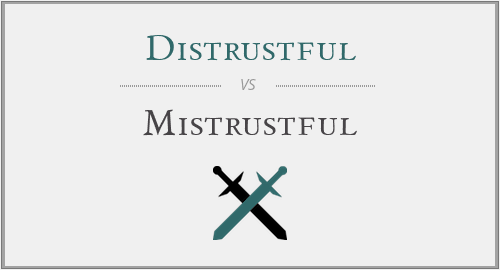Origin of the words
Distrustful
Distrustful is an adjective of the word distrust, which is the opposite of trust and simply means absence of trust.
The word first originated in 1505-15 and is in the same lines as some other words like disappoint, dissatisfaction, dispassionate, dishonest and other feelings.
The prefix dis means not, reverse, undo, negate
Mistrustful
Mistrustful comes from mistrust and was first used in 1350–1400. This is the natural antonym of trust just like few other words – misunderstanding, mishandling, miscalculate, mispronounce and many more.
The prefix mis means bad, mistaken or wrong(ly)
Initially, the word mistrustful was used as the opposite. Later on, the word distrust was introduced and these two words are now used interchangeably.
Now, coming to the difference –
Mistrustful is used when the person does not trust someone based on their own intuition/assumption. It means being doubtful about a person’s reliability. If we go by the prefix, mistrust would mean ‘wrong to trust’ someone.

· I want to give her a benefit of doubt, but her behaviour makes me mistrust her.
· It has been so long since he talked to me, so when he called me today, I was mistrustful of his intentions.
· If you are too mistrustful of your employees, you will never be happy with whatever they do.
Distrustful is often used when not trusting someone is supported by some previous experience or facts. When you know someone is being dishonest, you would distrust them. Simply put, distrustful is complete lack of trust on someone (prefix dis).
· I used to share all my feelings with him, but he turned out to be distrustful and made a mockery of my feelings in front of everyone.
· Politicians are very distrustful. We vote for them but they don’t live up to their promises.
· This company is very distrustful with their services, they never complete given projects on time.
Here is the gist – you can use mistrustful and distrustful interchangeably on most occasions, however if you know why you don’t want to trust a person – use distrust, and if there is no definite fact but you still don’t want to trust a person – use mistrust!




Have a discussion about this article with the community:
Report Comment
We're doing our best to make sure our content is useful, accurate and safe.
If by any chance you spot an inappropriate comment while navigating through our website please use this form to let us know, and we'll take care of it shortly.
Attachment
You need to be logged in to favorite.
Log In